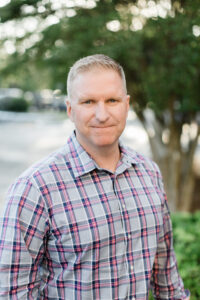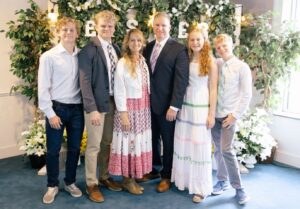The Master’s Seminary was the perfect school for Daniel Gillespie, senior pastor of Eastwood Community Church in Wilmington, North Carolina. In fact, in many ways it was built for men just like him. That’s not because of its geographical location. The Master’s Seminary is 2,601 miles from Wilmington, where Daniel grew up. Talk to him for any length of time and you’ll notice his distinct North Carolina accent. He loves his hometown and the Tar Heel state. He went to college at North Carolina State. After graduation, he returned to Wilmington. If geography was what mattered most, if it was what defined Daniel, there’s no chance The Master’s Seminary would have been the perfect school for him.
 The Master’s Seminary also wouldn’t have been the perfect school if living near family was what mattered most. Like Daniel, his wife, Lisa, grew up in Wilmington. Their families live not far from each other. And their families both love the Lord.
The Master’s Seminary also wouldn’t have been the perfect school if living near family was what mattered most. Like Daniel, his wife, Lisa, grew up in Wilmington. Their families live not far from each other. And their families both love the Lord.
“I was raised in a really strong Christian home that had me faithfully in front of the gospel,” Daniel said. “And I would say, like Timothy, both my mother and my grandmother were the most instrumental in leading me to Christ at an early age.”
Because of the closeness of their families, it would have made sense for Daniel and Lisa to stay in Wilmington. Moving across the United States and starting a family in Los Angeles, far from grandparents, great-grandparents, and aunts and uncles, would seem to be less than ideal, a strike against TMS as the perfect school for Daniel.
If finances were a deciding factor in the decision to go to seminary, The Master’s Seminary wouldn’t have seemed like the perfect fit. The cost of living in California is far higher than in North Carolina. The average median price of a home in Wilmington is much lower than in Los Angeles. If they had chosen to stay in North Carolina, they could have bought a home instead of living in an apartment in LA.
If the Gillespies were more inclined to the geographical location, family ties, and finances of North Carolina, why was The Master’s Seminary Daniel’s first option—the only school he seriously considered—when it was time to prepare for pastoral ministry?
“The school had a reputation as the place you go to learn the Bible,” Daniel said. “I knew that wherever I ended up in ministry, there was one thing I was going to need more than anything else: a rich, in-depth knowledge of the Bible. So when I was thinking about seminary, I only had one criterion: What is the best place to go to learn the Bible? Based on that criterion, TMS was the only school I considered.”
When Daniel enrolled at TMS in the fall of 2000, he quickly realized that as much Bible as he was learning in the classroom—and he was learning a lot—he was benefiting just as much from Grace Community Church. There he was not only growing in his knowledge of Scripture, but he was also experiencing practical, real-life training for the pastorate as he built relationships, taught in Bible studies and fellowship groups, counseled, and led ministries.
“What I didn’t understand until I got to TMS was how big its connection with Grace Church would be in my life,” Daniel said. “I joined the Grace Church staff nine months after moving to LA and my time in the classroom and on staff there would give me a love for the Word and a passion to study it. For that reason, when guys talk to me today about seminary—if they ask me where they should go—I always point to TMS. I don’t think another seminary models the church and training model as well as TMS and Grace Church.”
After finishing his education at TMS, Daniel considered ministry opportunities in California and Alabama, but the Lord quickly made it clear that he wanted Daniel to take all the lessons he’d learned at TMS and apply them in his hometown, Wilmington, North Carolina.
In the summer of 2006, Daniel got a phone call from a church in Wilmington that was struggling financially, shrinking in numbers, and had been without a pastor for an extended period of time. They asked him to fill the pulpit. After Daniel’s first week in the pulpit, they wanted him back a second time, then a third and fourth. After a month of pulpit supply, the leadership asked Daniel if he’d consider becoming their full-time pastor. That was the spring of 2006. Daniel would pastor that church for the next 17 years, leading it from a church on the verge of closing its doors to a healthy, stable congregation with between 200 and 300 people each week. Then in God’s providence, a surprising opportunity came along this past spring to merge Daniel’s church with another in the area.
“We had run out of space and had no parking or seats. We were looking for another building,” Daniel said. “I had a strong conviction that we shouldn’t do multi-site and I didn’t really want to do multiple services. As we were praying about that, we heard about a church in the area that was struggling. They had an expositor leading them, but the church had dwindled to around 100 people despite having a building that could seat nearly 900. Through a series of conversations, we decided to merge and take on a new church name. That’s how I’ve become the senior pastor of Eastwood Community Church in Wilmington. By God’s grace, the merger has been smoother than I anticipated. We are so grateful and see so many ministry opportunities through this merger.”
The growing ministry opportunities Daniel sees are in part because of the growth of the city that surrounds Eastwood Community. Significant numbers of people from the northeast are moving into the area, bringing wealth, as well as a more secular mindset.
“Our church is in the heart of town, close to a university campus,” Daniel said. “There’s a lot of spiritual darkness here, and that may surprise people because it’s in the South and a lot of people assume it’s the Bible belt. But the reality is a lot of people have a veneer of religion but aren’t truly following Christ.”
As he leads a growing ministry in a growing city, Daniel is keenly aware that the pastorate can be all-consuming if he lets it be. Daniel and his wife, Lisa, also have four children—three boys and a girl. The oldest is in college, the other three in high school. All four still live at home. Knowing he only has a few more years with his children before they leave home, Daniel wanted to follow advice Sinclair Ferguson passed along to him and a group of pastors at a Shepherds Conference: “Have as many strings to your children as possible.” For years, one of those key strings had been sports. Daniel grew up playing sports. He’d loved coaching his children or watching them play soccer, basketball, or baseball. But as they grew older and their time in youth sports wound down, Daniel knew he needed to establish another string. Providentially, a unique one has recently come along.
“Four or five years ago, my boys and I met a knife-maker here in town,” Daniel said. “He taught my boys how to make knives.”
 Just as important as the actual education in knife-making was the encouragement this man provided. He told Daniel that his sons were gifted at the craft and suggested that the Gillespie family make a business of it. At first, the idea had limited appeal to Daniel. Shepherding is more than a full-time job for him. And he loves the work of the ministry. He had no intention of leaving it or even weakening it by distracting himself with a start-up business. But as his boys became more and more invested in the process, even using old wood their grandfather had acquired from a refurbished battleship off the coast of Wilmington to craft the handles, Daniel saw a unique opportunity to strengthen his bonds, tie the strings as Ferguson would say, with not just his children, but his entire family.
Just as important as the actual education in knife-making was the encouragement this man provided. He told Daniel that his sons were gifted at the craft and suggested that the Gillespie family make a business of it. At first, the idea had limited appeal to Daniel. Shepherding is more than a full-time job for him. And he loves the work of the ministry. He had no intention of leaving it or even weakening it by distracting himself with a start-up business. But as his boys became more and more invested in the process, even using old wood their grandfather had acquired from a refurbished battleship off the coast of Wilmington to craft the handles, Daniel saw a unique opportunity to strengthen his bonds, tie the strings as Ferguson would say, with not just his children, but his entire family.
“Making and selling knives has taught my children so much about budgeting, how much materials cost, and what’s the difference between profit and revenue,” Daniel said. “Those are great lessons they’ve learned through this business. It’s also taught them the value of hard work. The more knives you make, the more revenue you can potentially produce. And on top of that, we make the knives at my mom’s house. She lives three doors down from us and she gets to have her son and grandchildren in her house on a regular basis, working and being together.”
Daniel and his sons named their company Jocko after Daniel’s father, who passed away several years ago. That way the family connections at the heart of the company are part of the name as well.
Since starting the company with his sons, Daniel has seen all kinds of surprising benefits to his ministry. It gives him a point of connection with many of his congregants, particularly those who work with their hands for a living.
“I think it’s helpful for pastors to understand what work is outside of pastoral ministry,” Daniel said. “It’s nice when a blue-collar guy comes in and sees I’ve got cuts on my hands, or I get dirty and sweaty, and it helps me appreciate a different work than I do.”
The business has also given Daniel more evangelistic opportunities than he’d normally have. It’s connected him to unbelievers in business around Wilmington. Also, the actual work of knife-making is labor intensive, but it requires his hands more than his head. That gives him an opportunity to pray, listen to sermons and podcasts, or simply to think. That time has had profound benefits for his soul.
 “This is a sweet season with my family, the business, and our ministry,” Daniel said. “I’m so grateful for the church and the spirit among the people, especially after the merger. We are excited about what the Lord has in store for us as we minister in Wilmington and serve as a light for expository preaching, sound doctrine, and, of course, the gospel of Jesus Christ.”
“This is a sweet season with my family, the business, and our ministry,” Daniel said. “I’m so grateful for the church and the spirit among the people, especially after the merger. We are excited about what the Lord has in store for us as we minister in Wilmington and serve as a light for expository preaching, sound doctrine, and, of course, the gospel of Jesus Christ.”
More than two decades after leaving Wilmington and moving to Los Angeles for seminary, Daniel is still seeing so many benefits from his decision to attend The Master’s Seminary.
“I would say two to three times a year, I reach out to Pastor John and thank him for anchoring my ministry in the Bible,” Daniel said. “God used him and TMS to give me a love for the Word, to give me a love for studying it, and to teach me how to study it. I am eternally grateful for the legacy The Master’s Seminary has in my ministry. It was the perfect school for me.”